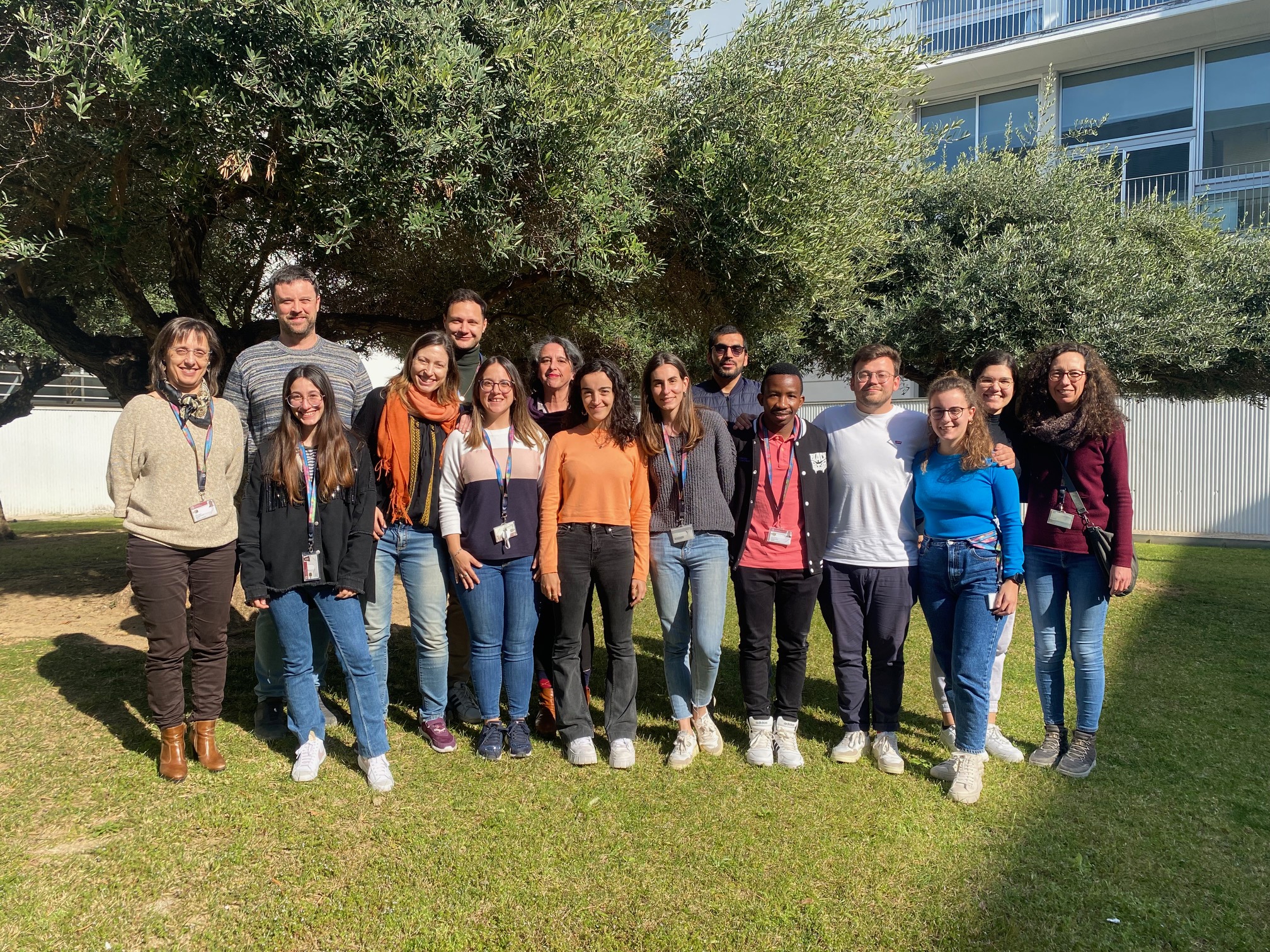
The research group aims to study the bioactivity of food in the gastrointestinal tract, ie to assess how different components of our diet can adversely or beneficially affect our gut, and how this interaction can influence the health. of the rest of the body. Within our lines of study, we emphasize the characterization at the molecular level of the interaction of components of the diet with the enteroendocrine system, the ability of these compounds to modify the integrity of the intestinal barrier and its immunomodulatory effect, as well as the study of alterations of the intestinal microbiota caused by certain foods, the analysis of the epigenetic effects of different bioactive compounds in situations of metabolic stress such as obesity or aging and the study of the effect of sources alternatives of high nutritional quality and more environmentally sustainable proteins.

Dra. Montse Pinent Grau
Our reseach group is composed of PhDs, PhD students and technicians. We are focused on the description and understanding how food bioactives modulate metabolism and health through enterendocrine signals, and their effects on appetite and anti-inflammatory activity, working mainly at the gastrointestinal tract level.
2017-2019: 2017 SGR 289. Molecular Bioactivity of Food. Agència de Gestió d’Ajuts Universitaris i de Recerca (AGAUR).
2018-2021: Preventive long-lasting effects of food bioactives on gastrointestinal tract under metabolic homeostatic challenges: obesogenic diet and aging. AGL2017-83477-R. MINISTERIO DE ECONOMÍA Y COMPETITIVIDAD
Envejecimineto Saludable y Sostenible amb Proteïna de Insecto (ESSARPI) Funding entity: Diputación de Tarragona Duration: 2020 – 2021 Principal Investigator: Maria Teresa Blay Olivé
Grau-Bové C, Miguéns-Gómez A, Gonzalez-Quilen, C, Fernández-López JA, Remesar X, Torres-Fuentes C, Ávila-Román J, Rodríguez-Gallego E, Beltrán-Debón R, Blay M, Terra X, Ardévol A, Pinent M. Nutrients. 2020;12(12):E3784. PMID: 33260866 Free article
Grau-Bové C, Sierra-Cruz M, Miguéns-Gómez A, Rodríguez-Gallego E, Beltrán-Debón R, Blay M, Terra X, Pinent M, Ardévol A. Nutrients. 2020 Nov 27;12(12):E3647. PMID: 33260866 Free article.
doi: 10.3390/nu12123647.
Miguéns-Gómez A, Grau-Bové C, Sierra-Cruz M, Jorba-Martín R, Caro A, Rodríguez-Gallego E, Beltrán-Debón R, Blay MT, Terra X, Ardévol A, Pinent M. Nutrients. 2020 Aug 7;12(8):2366. PMID: 32784756 Free PMC article.
doi: 10.3390/nu12082366.
Casanova-Marti, A.; Gonzalez-Abuin, N.; Serrano, J.; Blay, M. Teresa; Terra, X.; Frost, G.; Pinent, M.; Ardevol, A.
Molecular nutrition & food research Pages: e2000303 Published: 2020-Jul-01 (Epub 2020 Jul 01)
Grau-Bove, C.; Gonzalez-Quilen, C.; Terra, X.; Blay, M Teresa; Beltran-Debon, R.; Jorba-Martin, R.; Espina, B.; Pinent, M.; Ardevol, A. Biomolecules Volume: 10 Issue: 6 Published: 2020 Jun 01
DOI: 10.3390/biom10060844
Gonzalez-Quilen, C; Grau-Bove, C; Jorba-Martin, R; Caro-Tarrago, A; Pinent, M; Ardevol, A; Beltran-Debon, R ; Terra, X; Blay, MT
EUROPEAN JOURNAL OF NUTRITION 2020 Mar 18
González-Quilen C, Rodríguez-Gallego E, Beltrán-Debón R, Pinent M, Ardévol A, Blay MT, Terra X.
Nutrients. 2020 Jan 2;12(1). pii: E130.
DOI: 10.3390/nu12010130 Review.
Ginés I, Gil-Cardoso K, D’Addario C, Falconi A, Bellia F, Blay MT, Terra X, Ardévol A, Pinent M, Beltrán-Debón R.
Biomolecules. 2019 Dec 12;9(12). pii: E865.
DOI: 10.3390/biom9120865
Ginés I, Gil-Cardoso K, Serrano J, Casanova-Marti À, Lobato M, Terra X, Blay MT, Ardévol A, Pinent M
Genes (Basel). 2019 Aug 8;10(8). pii: E598.
Ojeda-Montes MJ, Casanova-Martí À, Gimeno A, Tomás-Hernández S, Cereto-Massagué A, Wolber G, Beltrán-Debón R, Valls C, Mulero M, Pinent M, Pujadas G, Garcia-Vallvé S.
Future Med Chem. 2019 Jun;11(12):1387-1401. Epub 2019 Jul 12.
Casanova-Martí À, Bravo FI, Serrano J, Ardévol A, Pinent M, Muguerza B.
Food Funct. 2019 Jun 21.
DOI: 10.1039/c9fo00695h [Epub ahead of print]
González-Quilen C, Gil-Cardoso K, Ginés I, Beltrán-Debón R, Pinent M, Ardévol A, Terra X, Blay MT.
Nutrients. 2019 Apr 29;11(5). pii: E979.
DOI: 10.3390/nu11050979
Ginés I, Gil-Cardoso K, Terra X, Blay M, Pérez-Vendrell AM, Pinent M, Ardévol A.
Mol Nutr Food Res. 2019 Apr 12:e1800912. [Epub ahead of print]
Gil-Cardoso K, Comitato R, Ginés I, Ardévol A, Pinent M, Virgili F, Terra X, Blay M. Mol Nutr Food Res. 2019 Jan 17:e1800720. [Epub ahead of print]
Gil-Cardoso K, Ginés I, Pinent M, Ardévol A, Blay M, Terra X.
J Nutr Biochem. 2018 Dec;62:35-42. Epub 2018 Aug 30
Ginés I, Gil-Cardoso K, Robles P, Arola L, Terra X, Blay M, Ardévol A, Pinent M.
J Agric Food Chem. 2018 Aug 27. [Epub ahead of print]
DOI: 10.1021/acs.jafc.8b03046.
Olona A, Terra X, Ko JH, Grau-Bové C, Pinent M, Ardevol A, Diaz AG, Moreno-Moral A, Edin M, Bishop-Bailey D, Zeldin DC, Aitman TJ, Petretto E, Blay M, Behmoaras J. Mol Metab. 2018 May;11:18-32. Epub 2018 Mar 9
Ginés I, Gil-Cardoso K, Serrano J, Casanova-Martí À, Blay MT, Pinent M, Ardévol A, Terra X
Nutrients 2018, 10(3), 315;
DOI: 10.3390/nu10030315 (registering DOI)
Casanova-Martí À, Serrano J, Portune KJ, Sanz Y, Blay MT, Terra X, Ardévol A, Pinent M.
Food Funct. 2018 Feb 23. [Epub ahead of print]
DOI: 10.1039/c7fo02028g.
Dra. Montserrat Pinent Armengol: montserrat.pinent@urv.cat
MoBioFood Research Goup
Dept. de Bioquímica i Biotecnologia
Universitat Rovira i Virgili (URV)
Campus Sescelades
C/Marcel.lí Domingo 1
43007 Tarragona
https://www.facebook.com/MoBioFood
https://www.instagram.com/mobiofood/
see google mapsResponsible: Dra. Rosa Mª Jorba Martín
Responsible: Dra. Mònica Bulló Bonet
Responsible: Dra. Rosa Solà Alberich
Responsible: Dra. Teresa Auguet Quintillà